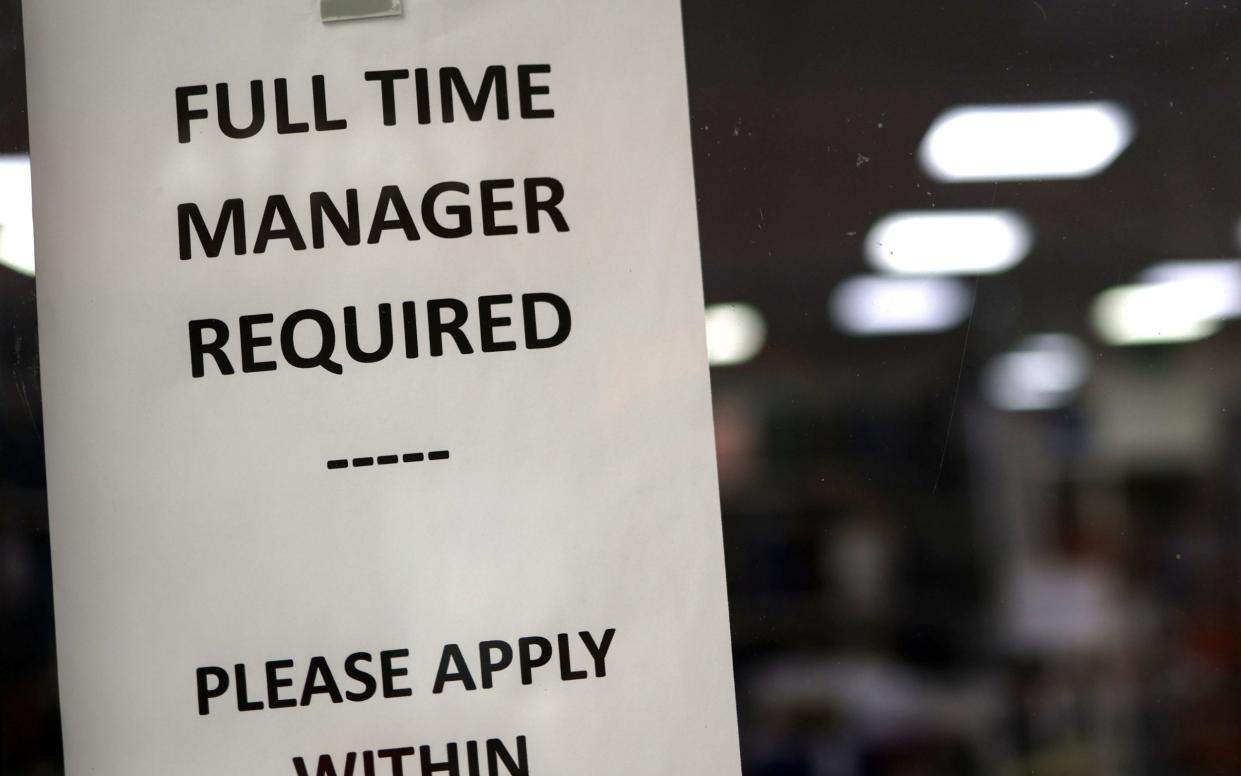Letters: The ultimate Conservative failure is the demise of Britain’s work ethic

- Oops!Something went wrong.Please try again later.
- Oops!Something went wrong.Please try again later.
SIR – How is it possible that a family solely dependent on benefits can be better off than someone earning £70,000 a year – more than twice the average wage? This is an absurd situation, and it is driving those who pay the most tax to despair.
The benefits system should be a safety net for those who fall on hard times or are unable to work through no fault of their own. It should help prevent poverty and destitution. It should not provide for a better lifestyle than that of someone who works and contributes to the system.
Is it any wonder that long-term unemployment and sickness are at record levels, while our economy stagnates? It is yet further proof that the Conservative Party no longer stands for conservative policies.
Andrew Holgate
Wilmslow, Cheshire
SIR – No country could possibly afford our hugely expensive free health service and absurdly generous welfare scheme. These leviathans gobble up the bulk of government spending, starving all other public services, such as defence and education.
Trying to balance the books without unthinkable tax rises can never happen unless and until these two monsters are tamed (“IMF warns tax cuts are unaffordable as ministers urge Hunt to be bold”, report, January 31).
Andrew Bremer
London SE21
SIR – We are £2.7 trillion in debt. How can Jeremy Hunt possibly think about tax cuts?
Keith Jacques
Stafford
SIR – How can the Government plan policymaking when the predictions from the Office for Budget Responsibility are often so wildly inaccurate?
Simon Bird
Penn, Buckinghamshire
SIR – Rather than worrying about how to redistribute in tax relief the few billions of pounds acquired through fiscal drag and lower interest rates on the national debt, the Conservatives should ring-fence this money for the specific purpose of fixing Britain’s potholes.
A minister should be put in charge and he or she should ensure the potholes are fixed properly and not just filled in until the next frost arrives.
Hard-pressed car owners would be delighted, and the money saved by the councils could be put towards fulfilling their statutory requirements, such as care for the elderly and the mental health of the young.
Voters who say they prefer their money to go on services rather than tax cuts (such as inheritance tax relief) would see something happening throughout the country – and feel that Rishi Sunak is at last doing something to fix broken Britain.
John D P Wiser
Linby, Nottinghamshire
French Brexit bashing
SIR – The underlying reason for Port Talbot’s furnaces closing is not Brexit, as Gabriel Attal, the French prime minister, claims (report, January 31), but the Government’s obsession with net-zero policies, which make whole sectors of the economy unviable.
Mr Attal might not have noticed, but his own country – in common with the rest of the EU – is currently in open revolt against these same policies, which are also destroying livelihoods across Europe.
N H Bailey
Stockport, Cheshire
SIR – You report Gabriel Attal saying that he needs an “agricultural exception” to European Union red tape to fix the current farming crisis.
Do I detect a whiff of freshly picked cherry in the air?
Nigel Adams
Hertford
Lockdown lunacy
SIR – Madeline Grant (Comment, January 31) is absolutely correct in arguing that most of the assertions around the control and management of Covid-19 are beginning to crumble.
Whoever thought that incarcerating people in their houses (thus indirectly lowering their natural immunity), neglecting beneficial health-screening programmes and paying people to sit at home doing nothing would really help to contain a highly transmissible, airborne disease?
Ignorance surrounding the spread of the disease at the start of the pandemic may have excused some of this madness, but certainly not now – though the decision-makers will never admit they were wrong.
Dr David Walters
Retired consultant physician
Burton Bradstock, Dorset
HMRC backlog
SIR – To challenge a huge tax demand, I rang the HMRC helpline in June and October last year. When I eventually got through, I was told that the person could not deal with the problem. My letters were also ignored.
By January this year, with the deadline for payment closing in, I was getting desperate, so rang again. I was finally put through to an inspector, who dealt with the problem courteously and satisfactorily. He told me that my letters had been received but not read, as HMRC was still dealing with correspondence from May last year. That is appalling.
Dr Bernard Lamb
London SW14
Chiller on the loose
SIR– The officers who apprehended Daniel Fairbrother (report, January 29), during his training run for a marathon with a fridge strapped to his back, had obviously never read the 1998 bestseller Round Ireland with a Fridge by Tony Hawks.
Teri Austen
Wokingham, Berkshire
Shaving in captivity
SIR – I have also only ever used Cussons Imperial Leather soap when shaving (Letters, January 31).
It lathers well with cold water, which is all I have shaved with since attending Sandhurst 58 years ago, on the grounds that hot water was an unnecessary luxury and not worth hankering after in the event of capture. It stood me well as a soldier – and was also prescient, given energy prices.
Mervyn Lee
Westhill, Inverness-shire
No relief
SIR – I was incensed by your report (January 30) about people relieving themselves in public and councils prosecuting them for “littering”.
I am in my 80s and am incontinent. Twice a year, I travel more than 200 miles to see my daughter. I stop at service stations whenever possible but, in emergencies, I have to relieve myself in lay-bys too.
One day, these councillors will be old and will perhaps feel ashamed.
Mercia Cooper
Stoke Bruerne, Northamptonshire
SIR – Our beautiful countryside is disappearing under a blanket of litter. Verges up and down the country have become oceans of plastic, takeaway bags and drink cans, as people lob them out of their car windows.
In Newbury, middens of cider cans spring up overnight in the hedgerows. When I walk Dolly, my German shepherd, I invariably fill a bin bag. If we ever catch a litter lout in the act, I let Dolly off the lead to deal with them.
Louisa Houghton
Newbury, Berkshire
Flexible working
SIR – I have a chronic illness that at times leaves me unable to walk. A few years ago, when I asked to work from home occasionally to accommodate this, I was fired from my City job.
The UK has made major progress in flexible working practices since then, so when I read that the City firm EY has started monitoring office attendance (report, January 30), my heart sank. I feel huge empathy for the employees who rely or thrive on flexible working, such as those with specific health needs or caring responsibilities – who are predominantly women.
Molly Johnson-Jones
London E9
Divine redistribution
SIR – The Church of England owns about 16,000 churches and has an endowment worth more than £10 billion that generates about £1 billion in returns per annum.
Perhaps the buildings could be repurposed to house migrants, and the income used to feed and clothe them.
Phil Stewart
London SW14
SIR– It appears that Justin Welby, the Archbishop of Canterbury (Letters, January 31), now sees himself as the Church of England’s answer to Gary Lineker. God help us.
Nick Brigham
Clint, North Yorkshire
Novice players of the hurdy-gurdy – be warned

SIR – As the owner of six hurdy-gurdies, all skilfully made by my husband, I would advise caution to Tim Stanley, who is looking for someone to repair his (Comment, January 29) – or anyone else tempted to take up this fascinating instrument.
Once strung, it takes far more time to get all the strings, even the sympathetic ones, in tune, than it does to charm one’s audience with a performance.
Joy Hungerford
Sidcup, Kent
SIR – Since 1992 my wife and I have participated in numerous street organ festivals on the Continent, particularly in France. On occasion, a musician playing a hurdy-gurdy would also be present.
Between festivals we would usually stay at a bed and breakfast, where evening meals were available. Once we were joined at dinner by a Frenchman. The next morning he said he wished to show us something. It turned out to be a hurdy-gurdy, one of many he had made. He demonstrated it to us, and I retrieved our street organ and played it – all to our hostess’s delight.
Regrettably I cannot find the Frenchman’s details for Tim Stanley.
Geoff Todd
Banbury, Oxfordshire
A familiar flaw in the PM’s pharmacy proposal
SIR – The Prime Minister’s idea of getting us to use a pharmacy instead of the local doctor is great (Commentary, January 31), but unfortunately pharmacies are like bank branches: there aren’t any.
My small town had three, all now gone; supermarket pharmacies have closed and even a large branch of a local Boots no longer has one.
When my children were small, the wonderful local chemist would treat, strap up and dress wounds, and produce a magical cough cure, but his shop is now a bookmaker.
After a fall recently, I found a chemist in the area and asked if someone could put a plaster over a cut on my face. I was told that staff were not allowed to do this.
Diana Humble
Upper Woolhampton, Berkshire
SIR – Some years ago I visited a pharmacist while suffering from what turned out to be the early symptoms of shingles. He diagnosed an insect bite and sold me antihistamine, condemning me to an unnecessarily protracted and painful recovery.
Allowing pharmacists to diagnose and treat some common conditions without a doctor’s prescription may have unforeseen consequences.
Charles Smith-Jones
Landrake, Cornwall
Letters to the Editor
We accept letters by email and post. Please include name, address, work and home telephone numbers.
ADDRESS: 111 Buckingham Palace Road, London, SW1W 0DT
EMAIL: dtletters@telegraph.co.uk
FOLLOW: Telegraph Letters on Twitter @LettersDesk
NEWSLETTER: sign up to receive Letters to the Editor here

